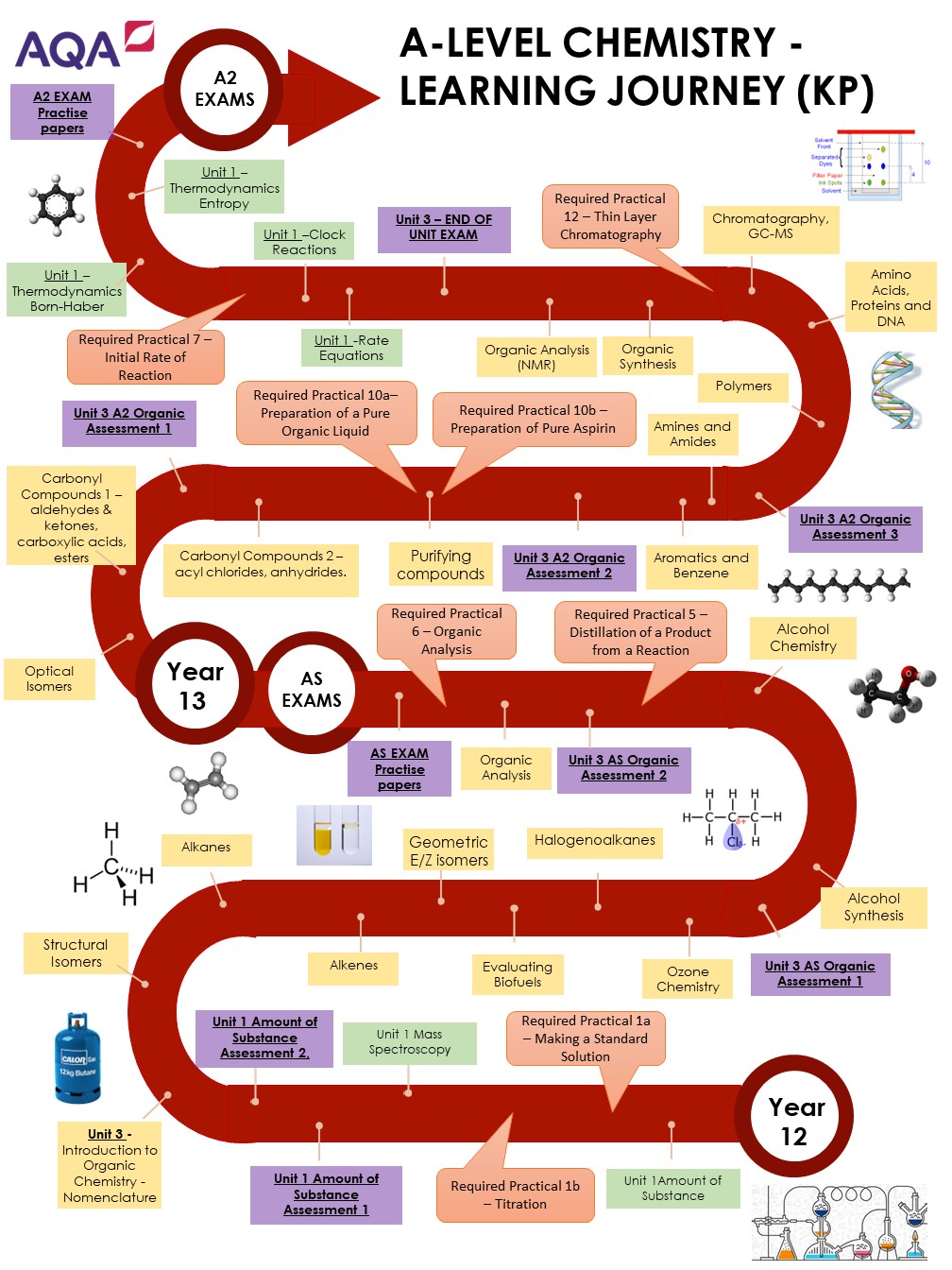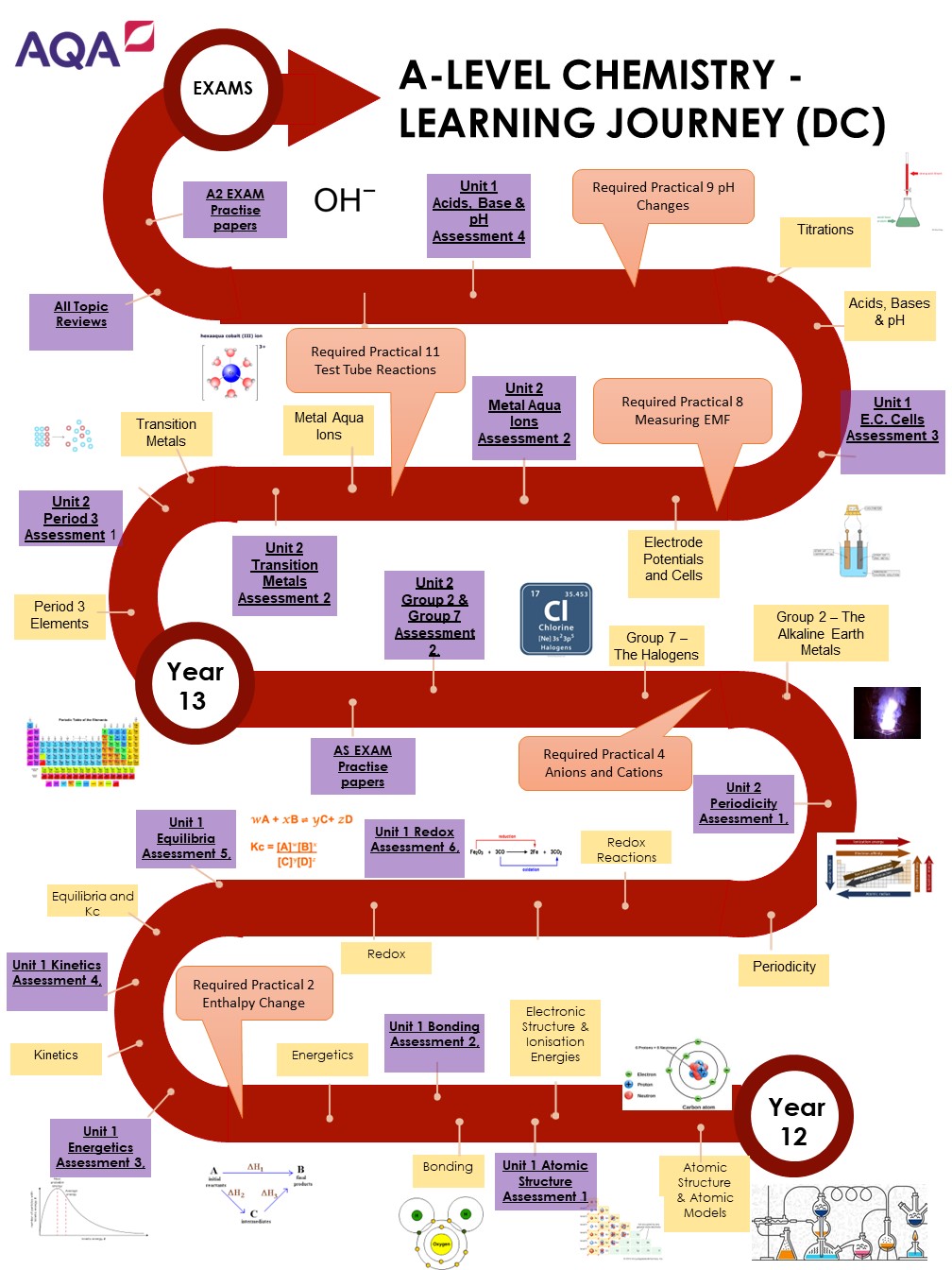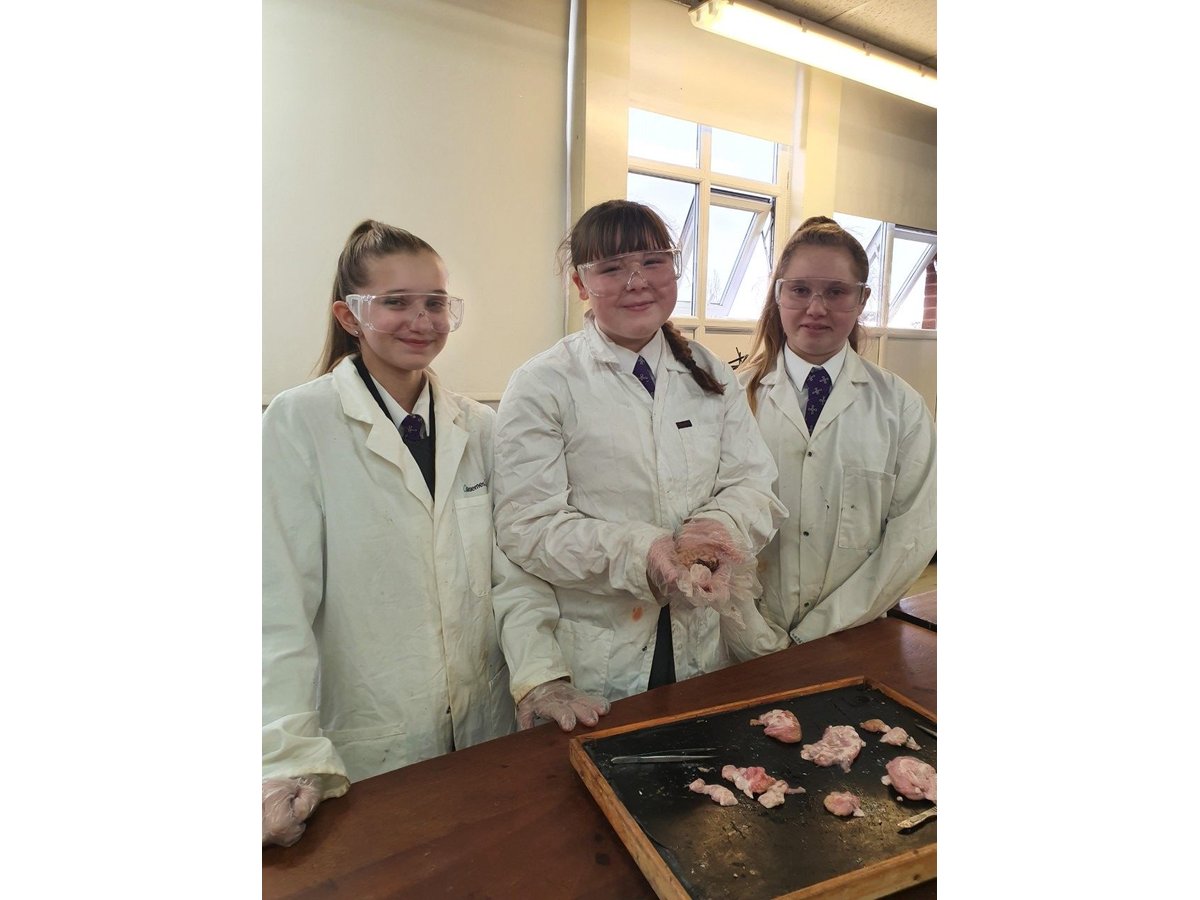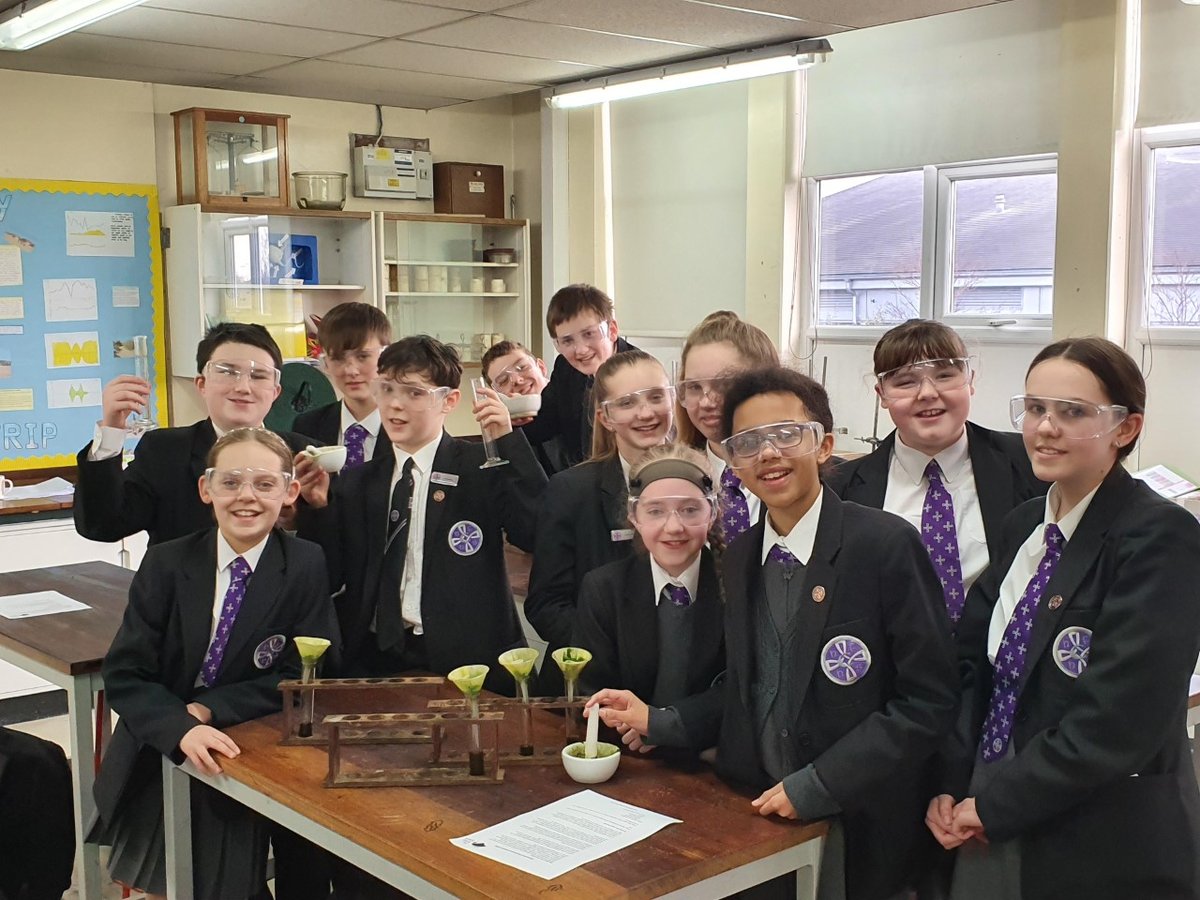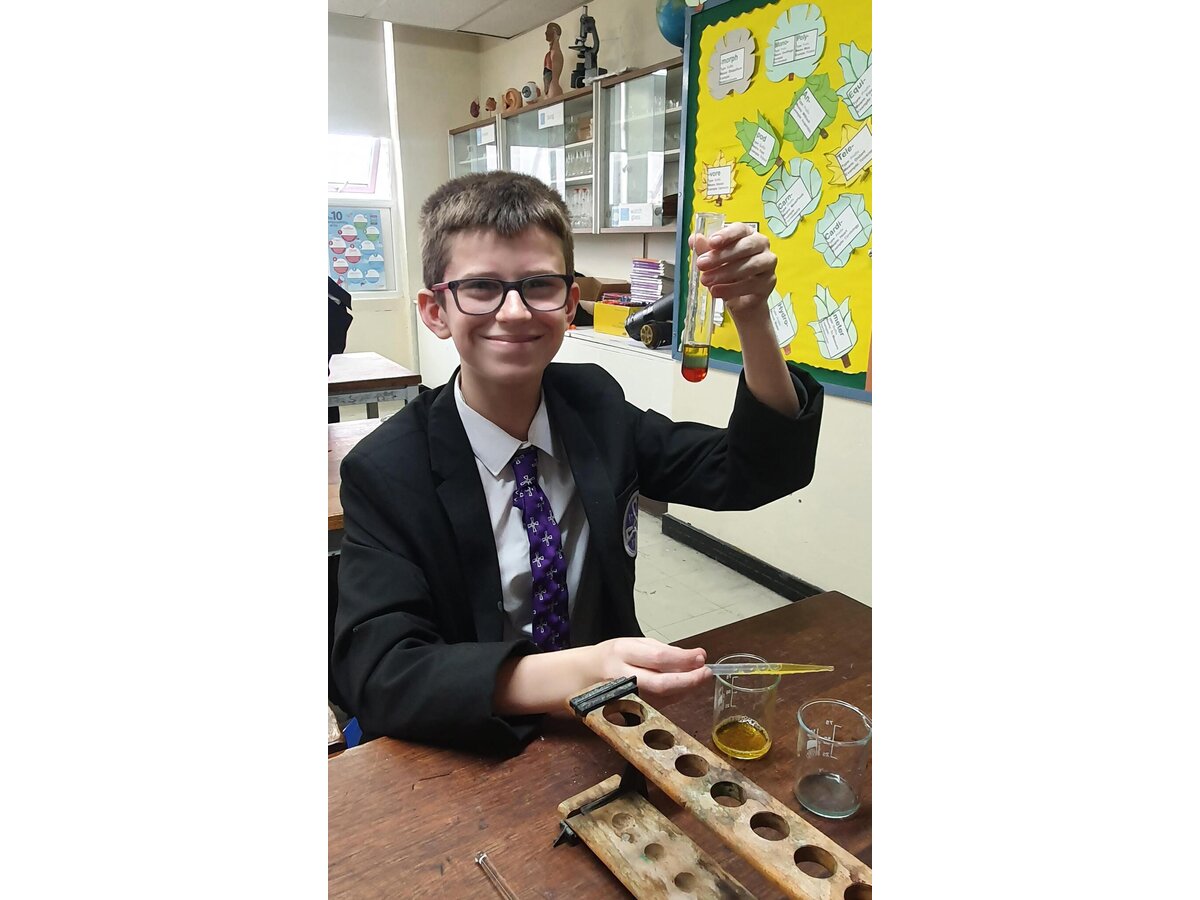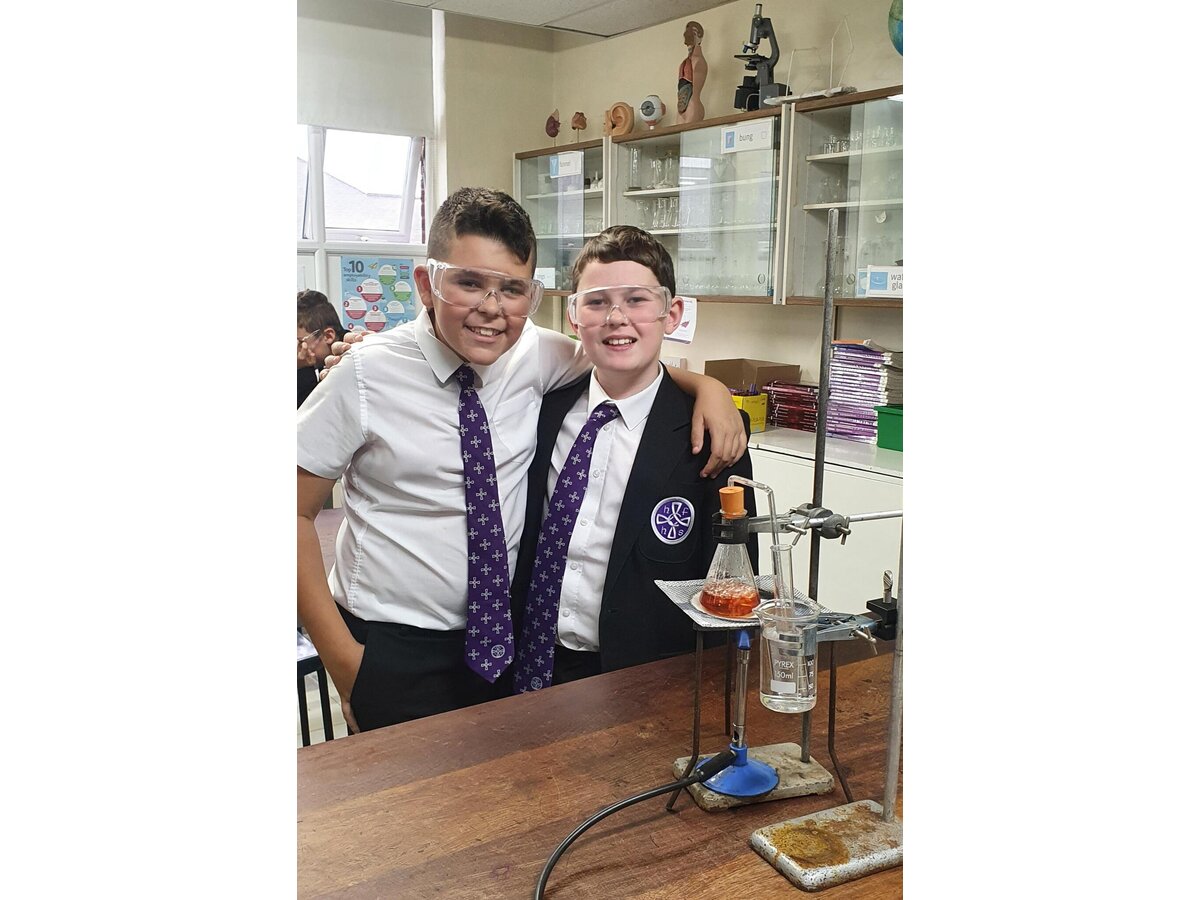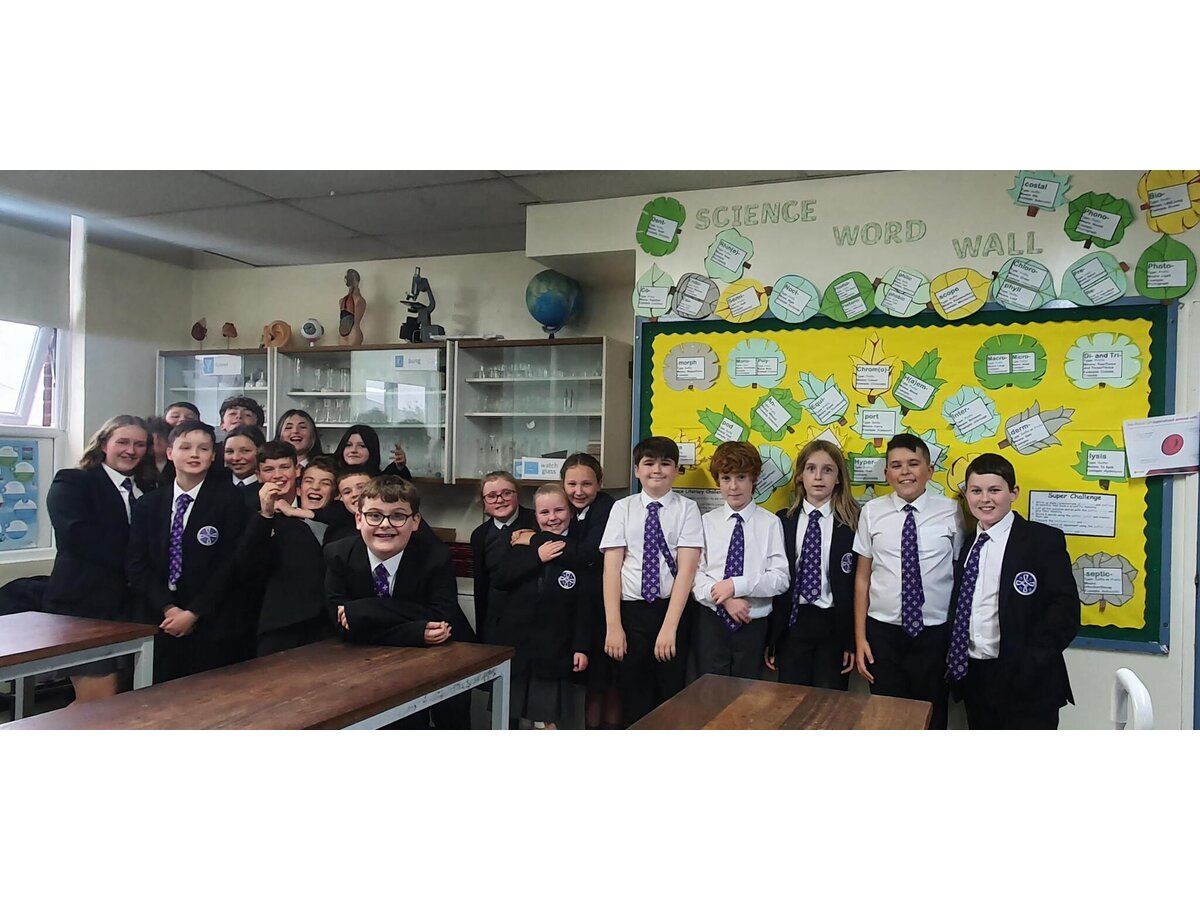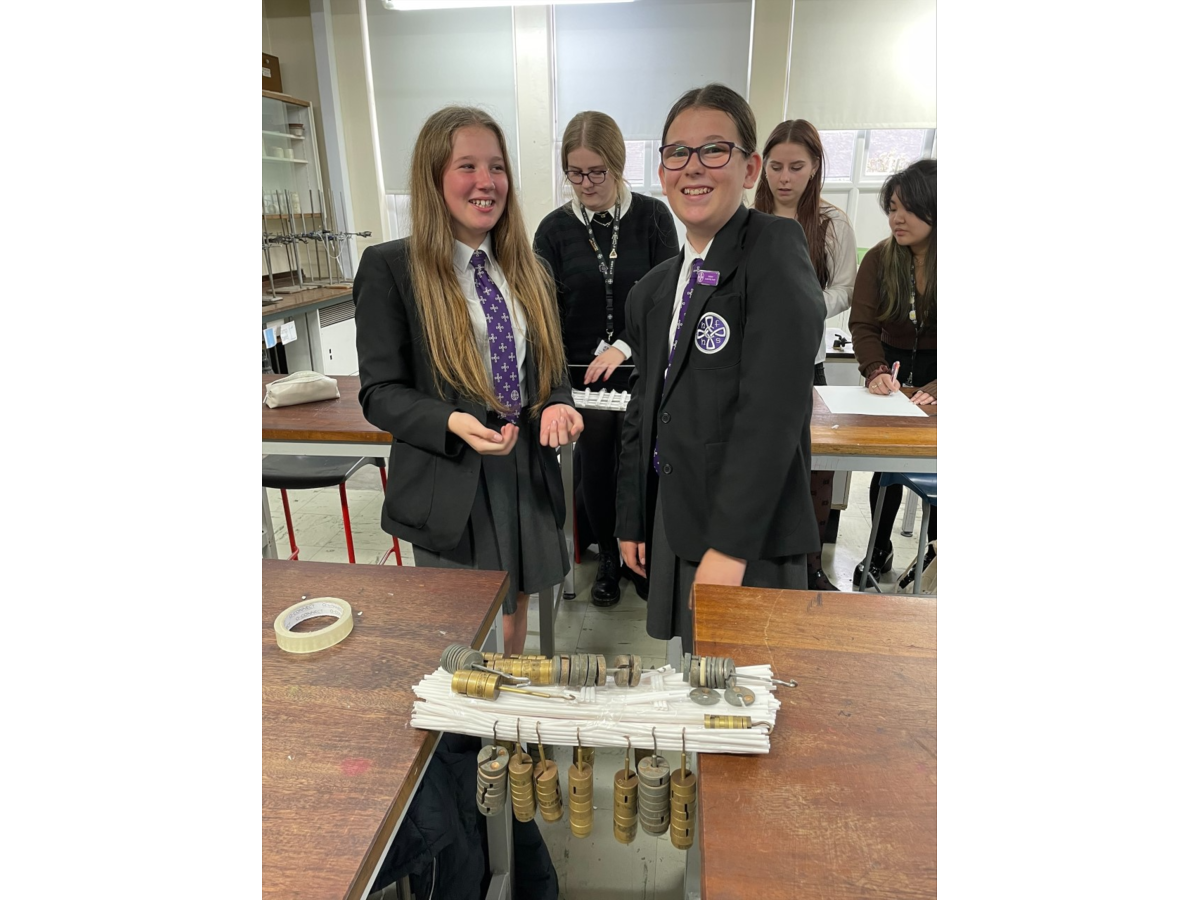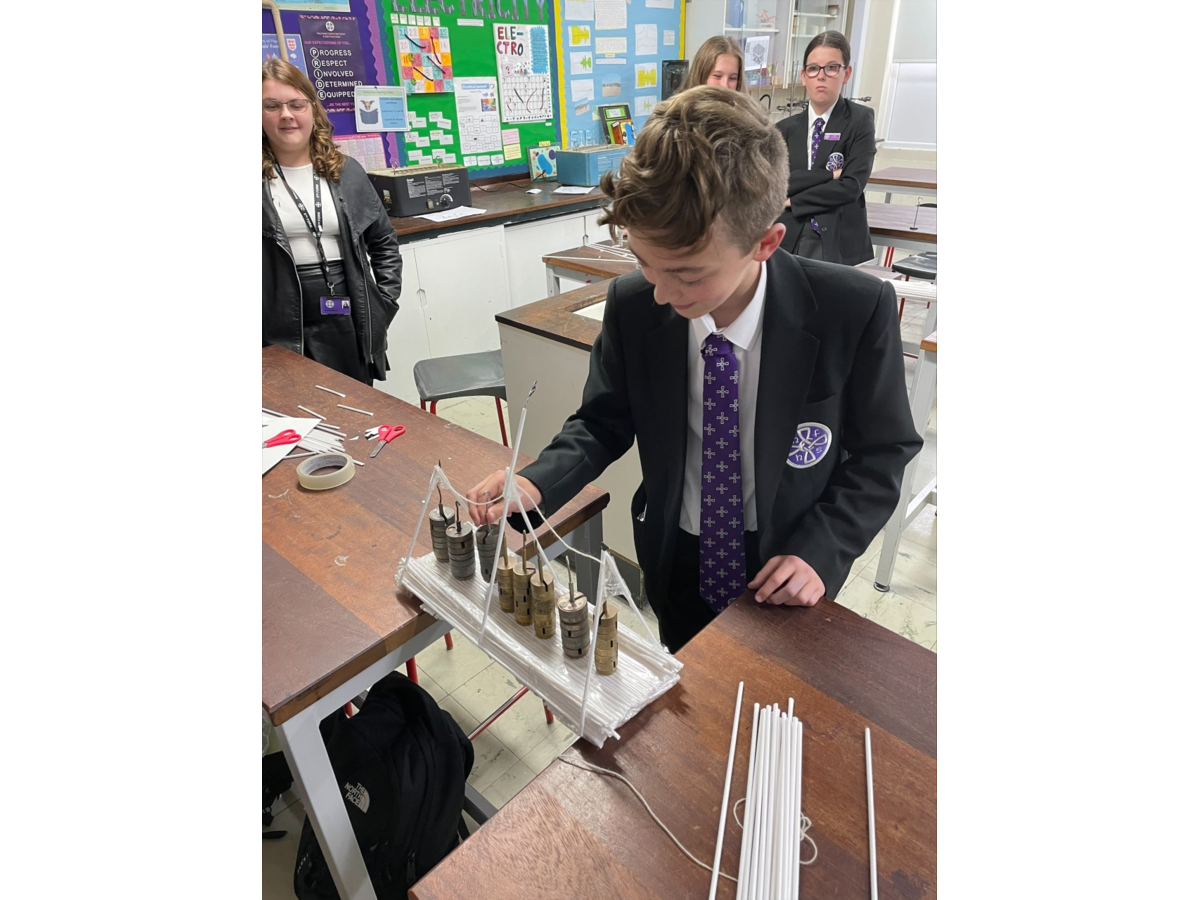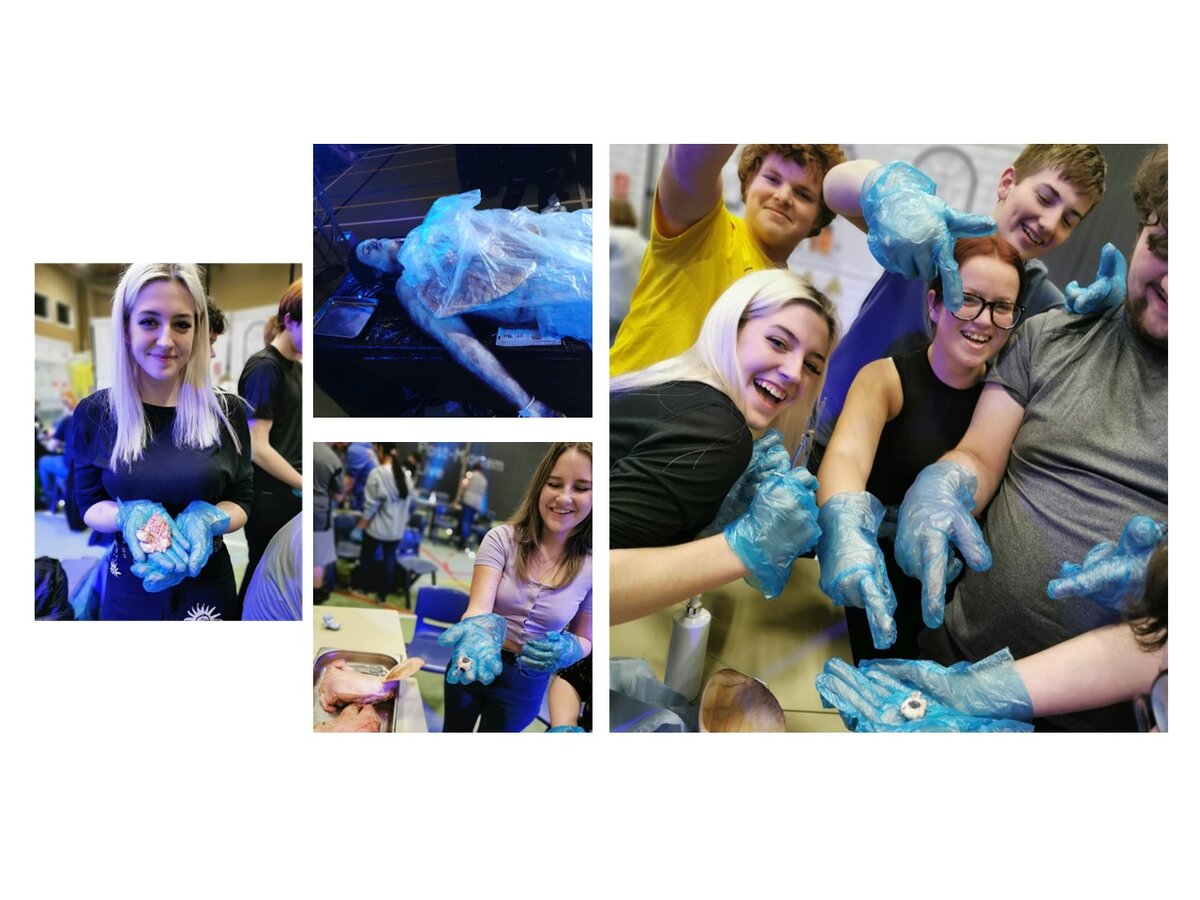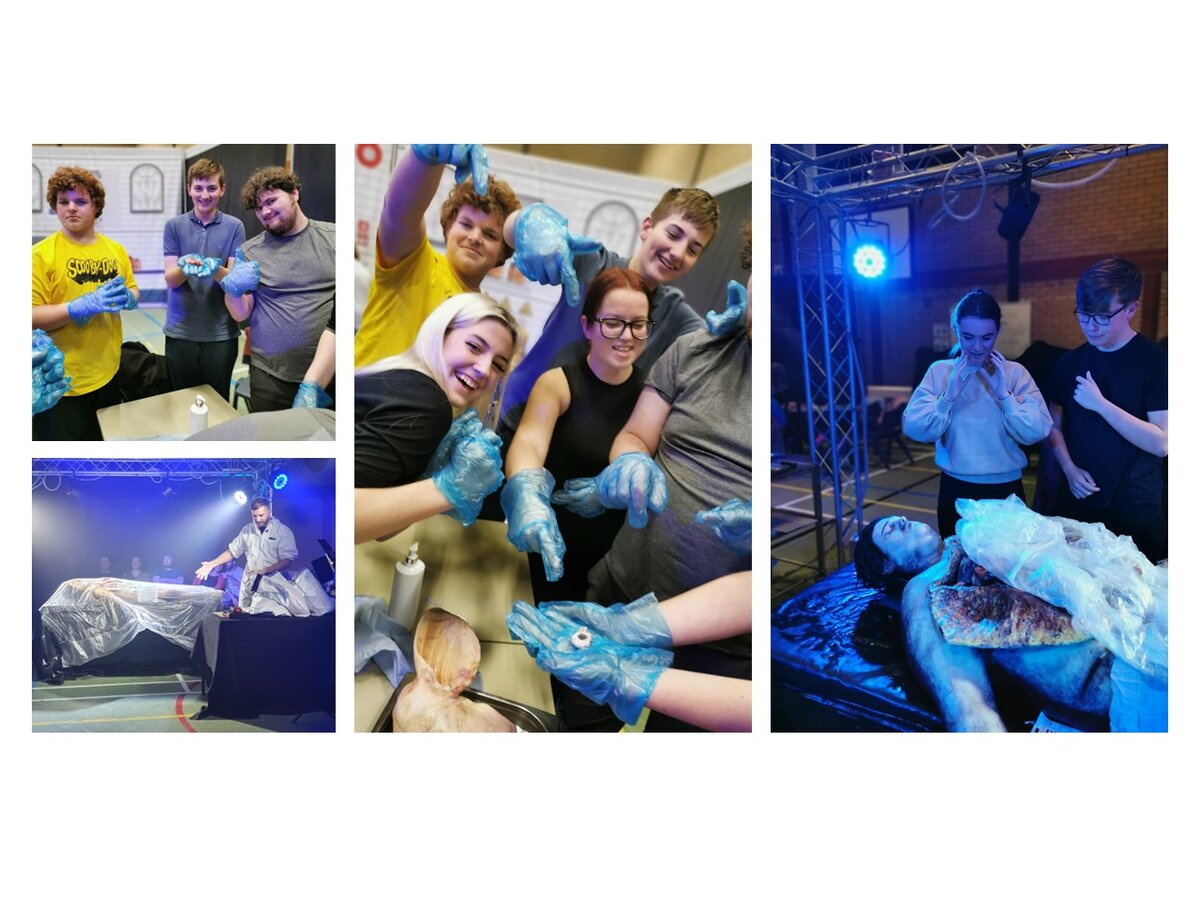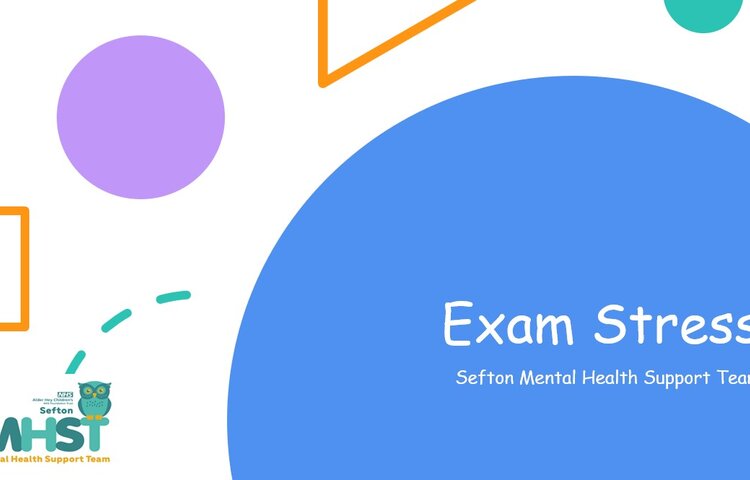Science
Head of Department - Mr. S J Horne
The science department's vision is
- to engage young people in science and develop scientists of the future
- to create a stimulating and exciting learning environment where the teaching is both challenging and supportive
- to empower students to learn independently and achieve to the very best of their ability.
We wish to offer the highest standards including quality resources and a safe, comfortable environment.
Our Science Faculty is one of the largest in school, offering a total of four GCSEs, 5 courses at Key Stage 5 in science subjects. We have a very qualified team of teachers from every specialism.
The science department aims to educate our students to become citizens of a scientific world and perhaps inspire some to become future scientists and engineers. We hope to motivate students to consider the social, cultural and moral issues related to science. We aim to teach them to use scientific knowledge and understanding with confidence and accuracy.
Key Stage 3
Our three-year Key Stage three curriculum is based around the KS3 programme of study, prescribed by the national curriculum. It builds on the foundations of science that are covered at KS2. Baseline testing is undertaken to highlight gaps in understanding and to avoid unnecessary repetition. Gaps in skills, knowledge and understanding of key concepts are filled before developing deeper understanding. At KS3 students begin to select and handle specialist equipment in order to develop their practical skills. Students are taught all three science disciplines by a single teacher. Retrieval practice and recall is built into the curriculum as we believe that without this, students will not be able to apply their knowledge and ultimately link ideas.
Science - Key Stage 3 Curriculum Maps
Key Stage 4
Science is a core subject and must be studied by all students until they leave school. There are two routes of study at KS4 Science. Both routes follow AQA specifications. These new science GCSE will be first examined in 2018.
- Separate science GCSEs (Biology, Chemistry, Physics - 3 GCSE grades are awarded at the end of the course)
- Combined Science GCSE- Trilogy (2 GCSE grades are awarded at the end of the course)
For more details on each of the GCSEs we offer including specification and assessment details, please use the links below.
GCSE Biology- http://www.aqa.org.uk/subjects/science/gcse/biology-8461
GCSE Chemistry- http://www.aqa.org.uk/subjects/science/gcse/chemistry-8462
GCSE Physics- http://www.aqa.org.uk/subjects/science/gcse/physics-8463
GCSE Combined science: Trilogy- http://www.aqa.org.uk/subjects/science/gcse/combined-science-trilogy-8464/
Students will be placed in a set that reflects their ability in the subject and a range of assessments will be used to determine the most appropriate set.
All qualifications are linear. Linear means that students will sit all their exams at the end of the course. There is no coursework.
Subject content
All pupils will study the subject topics outlined in the table below. Those pupils studying separate science study each topic in more depth.
There are two exams for each component Biology, Chemistry and Physics. For students taking Combined Science, the papers are 1h15 minutes in length and each is marked out of 70.
For students taking Separate Science, the papers are 1h45 minutes and each is marked out of 100.
Instead of coursework, there are 21 required practical activities which are completed during the KS4 course. Questions on these practicals will appear on the final exam.
|
The required practicals |
Topics |
|
|
Biology |
Microscopy Osmosis Enzymes Food tests Photosynthesis Reaction time Field investigations |
1 Cell biology 2 Organisation 3 Infection and response 4 Bioenergetics 5 Homeostasis and response 6 Inheritance, variation and evolution 7 Ecology |
|
Chemistry |
Making salts Electrolysis Temperature changes Rates of reaction Chromatography Water purification |
8 Atomic structure and the periodic table 9 Bonding, structure, and the properties of matter 10 Quantitative chemistry 11 Chemical changes 12 Energy changes 13 The rate and extent of chemical change 14 Organic chemistry 15 Chemical analysis 16 Chemistry of the atmosphere 17 Using resources |
|
Physics |
Specific heat capacity Resistance I-V characteristics Density Force and extension Acceleration Waves Radiation and absorption |
18 Energy 19 Waves 20 Electricity 21 Magnetism and electromagnetism 22 Particle model of matter 23 Atomic structure 24 Forces 25 Space (GCSE Physics only) |
Key Stage 5
The Science Department offers a choice of 5 courses in the sixth form and is the biggest department. Overall, at least 10% of the marks in all assessments will require the use of mathematical skills. These skills will be applied across a wide range of contexts and will be at least the standard of higher tier GCSE mathematics.
Students will sit all of their external examinations at the end of the A- level course at the end of Year 13.
AQA A-level Biology
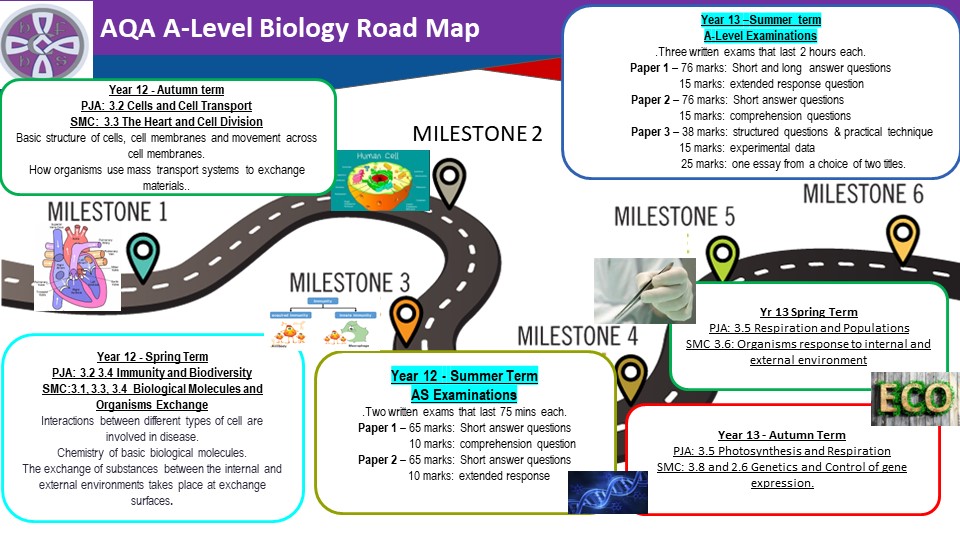
Preconditions for taking the course
A grade 7 or above in GCSE Biology and a grade 7 or above in Mathematics are needed or at least the combination of grades 7,7 in the Combined Science GCSE component if you have not taken separate sciences.
The core content topics are:
- Biological molecules
- Cells
- Organisms exchange substances with their environment
- Genetic information, variation and relationships between organisms
- Energy transfers in and between organisms (A-level only)
- Organisms respond to changes in their internal and external environments (A-level only)
- Genetics, populations, evolutions and ecosystems (A-level only)
- The control of gene expressions (A-level only)
Please follow the link below for further information:
https://filestore.aqa.org.uk/resources/biology/specifications/AQA-7401-7402-SP-2015.PDF
AQA A-level Chemistry
Preconditions for taking the course
A grade 7 or above in GCSE Chemistry and a grade 7 or above in Mathematics are needed or at least the combination of grades 7,7 in the Combined Science GCSE if you have not taken separate sciences.
The core content topics are:
- Organic Chemistry
- Physical Chemistry
- Inorganic Chemistry
Please follow the link below for further information:
https://filestore.aqa.org.uk/resources/chemistry/specifications/AQA-7404-7405-SP-2015.PDF
AQA A-level Physics
.jpg)
Preconditions for taking the course
A grade 7 or above in GCSE Physics and a grade 7 or above in Mathematics are needed or at least the combination of grades 7,7 in the Combined Science GCSE if you have not taken separate sciences.
The core content topics are:
- Measurements and their errors
- Particles and radiation
- Waves
- Mechanics and materials
- Electricity
- Further mechanics and thermal physics (A-level only)
- Fields and their consequences (A-level only)
- Nuclear physics (A-level only)
The following topics are options and students study one of these only.
- Astrophysics (A-level only)
- Medical physics (A-level only)
- Engineering physics (A-level only)
- Turning point in physics (A-level only)
- Electronics (A-level only)
Please follow the link below for further information:
https://filestore.aqa.org.uk/resources/physics/specifications/AQA-7407-7408-SP-2015.PDF
WJEC Level 3 Diploma in Medical Science
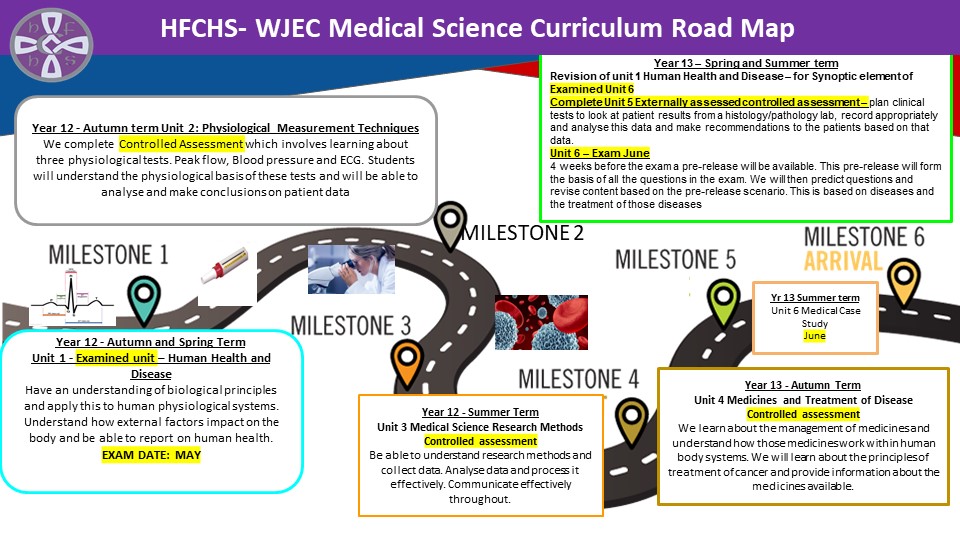
Medical Science is the science of dealing with the maintenance of health and the prevention and treatment of diseases. The Level 3 Applied Diploma in Medical Science is for learners who are interested in careers related to healthcare and medical research. Medical scientists are at the forefront of healthcare services, as they are vital in the diagnosis of disease, determining the effectiveness of treatments and searching for new cures.
During the first year students will have the opportunity to study three units. Two of these units are assessed within school and one is sat as an external exam at the end of Year 12. The first unit they do is physiological measurements. In this unit students learn how to measure peak flow and blood pressure and how to interpret results from ECG readings. They then complete a unit looking at how data collected from patients can be evaluated and analysed. The examined unit is based on human body systems and disease.
In Year 13 they study 3 further units; Clinical laboratory techniques, Medicines and the treatment of disease and a Medical Case study. The Medical Case study and the Clinical Lab techniques are both externally assessed by exam. Each unit has a clear medical science purpose which focuses the learning of scientific knowledge, understanding and skills into a meaningful context.
This qualification equips learners with scientific knowledge and understanding, as well as practical skills that would support progression to a range of job roles within health care. Job roles such as those within the areas of life sciences, i.e. carrying out a range of laboratory and scientific tests to support the diagnosis and treatment of disease, this could include microscopic examination of tissue samples, analysis of blood cells to investigate anaemia or analysis of samples to identify the cause of an infection. Alternatively there would also be opportunities to progress to job roles within the physiological sciences, working directly with patients, measuring and evaluating particular organ and systems, such as scientists working in neurophysiology recording the electrical activity in the brain.
Preconditions for taking the course
A grade 4 or above in separate science GCSE exams or a combination of at least 4,4 in Combined Science and a grade 4 or above in Mathematics are needed to be able to study this course.
Please follow the link below for further information:
https://qualifications.pearson.com/en/qualifications/btec-nationals.htm
Pearson Level 3 National Diploma in Forensic Investigation
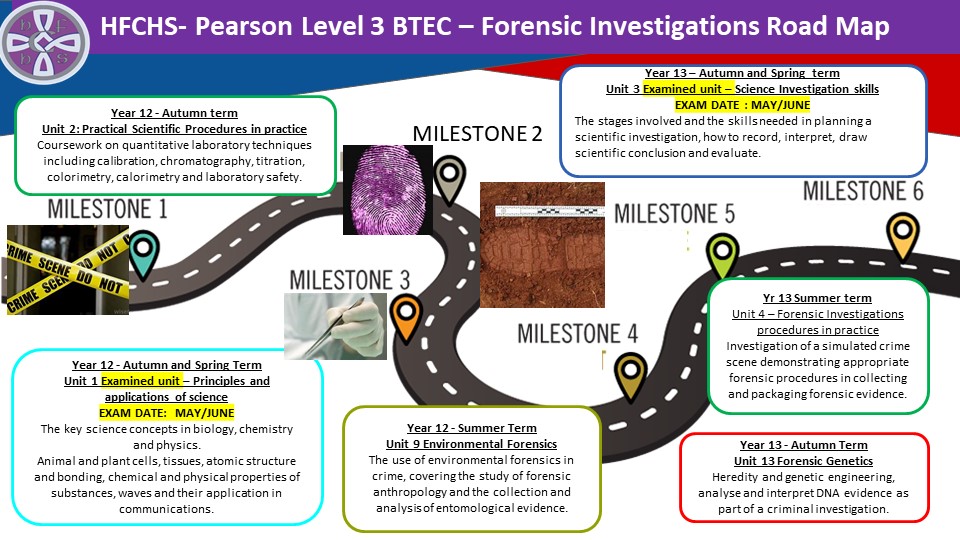
Forensic Science is defined as any scientific process used as part of a criminal investigation. This could be anything from dealing with remains in an autopsy room to the painstaking work involved in DNA profiling and fingerprint analysis
The main purpose of the qualification is to provide learners with the knowledge, understanding and skills in key scientific principles to support progress to higher education or employment in areas of forensic and analytical science, such as job roles in laboratories, school or hospitals. The qualification covers the key topic areas of forensic investigation.
The course is based around applying scientific ideas and techniques in real-life forensic contexts. Learning activities will include practical work, independent research, class discussions, presentations, online interactive tutorials, worksheets and note taking.
In order to achieve the Level 3 Applied Foundation Diploma in Forensic Investigation, learners are required to complete 6 units:
- Principles and Applications of Science
- Practical Scientific Procedures and Techniques
- Science investigation Skills
- Forensic Procedures in Practice
- Environmental Forensics
- Forensic Genetics
Assessment is through a balance of externally (210 hours) and internally (300 hours) assessed units over the two years. External assessment is of two types: A written examination for unit 1, and an externally set and marked task based assessment for unit 3.
Entry Requirements: English 5, Maths 5, Science Combined/Triple 5 as well as two other GCSEs at 5 or above.
Please follow the link below for further information.
Enrichment
At KS3 we offer a STEM club after school. Students are also able to apply to become Science Ambassadors.
There are many opportunities for students to attend lectures on topics from Nanotechnology to Quantum Physics and Space Science and visit University departments. We also have a number of students taking part in the University of Liverpool Nuclear Physics Masterclasses. There are links with the John Moores’ University Chemistry Department.
Students often help out at open evenings and Science students at Holy Family are invited to participate in an international Science study tour to a major European city once a year. To date we have visited The Large Hadron Collider in Geneva and have visited Universities to undertake lab work in Berlin and Brussels. There have been visits to Barcelona and Budapest.
Resources
To help GCSE students, here are a few online revision resources:
|
A useful revision aid with videos on a variety of science topics. Search for videos by topic and level. |
|
|
Choose an activity, revise it, test it and remember it! S-cool includes overviews, exam style questions, multiple choice questions and revision summaries on a range of GCSE science topics. |
|
|
A classic revision aid with subject overviews, interactive activities and questions on a variety of topics from different syllabi. |
|
|
With over 3,100 videos on everything from arithmetic to physics, GCSE students should be able to find videos on the topics they need. |
|
|
Check out the Planet Science YouTube playlists for inspiration. |
|
|
Designed to help students studying AQA Core Science, Additional Science, Biology, Chemistry and Physics. Each video is accompanied by revision notes and more videos are added every week. |
|
|
Exam tips, revision notes and links to past papers |
|
|
GCSE revision questions and quizzes |
|
|
Exam board pages for Core (4405) and Additional Science (4408) and also Biology (4401), Chemistry (4402) and Physics (4403) with links to syllabus and past papers |
|
|
Online homework website |
Careers
https://www.prospects.ac.uk/jobs-and-work-experience/job-sectors/science-and-pharmaceuticals
BIOLOGY
Click on the links below to find out more about the different careers available using Biology. You will find out entry requirements, university and apprenticeship opportunities, average salaries and much more!
1. General Practitioner (GP) https://www.careerpilot.org.uk/job-sectors/medical/job-profile/gp
2. Doctor (in a hospital)
https://www.careerpilot.org.uk/job-sectors/medical/job-profile/hospital-doctor
3. Nurse (in a hospital) https://www.careerpilot.org.uk/job-sectors/medical/job-profile/nurse
4. Pharmacologist https://www.careerpilot.org.uk/job-sectors/medical/job-profile/pharmacologist
5. Speech and Language Therapist https://www.careerpilot.org.uk/job-sectors/childcare/job-profile/speech-and-language-therapist
6. Optometrist https://nationalcareers.service.gov.uk/job-profiles/optometrist
7. Biomedical scientist https://www.careerpilot.org.uk/job-sectors/environment/job-profile/biomedical-scientist
8. Midwifery https://www.unifrog.org/student/subjects/helping-people/nursing-and-midwifery
9. Vet https://nationalcareers.service.gov.uk/job-profiles/vet#HowToBecome
Real world examples – watch videos of people who work in careers using Biology
- A GP - https://icould.com/stories/adebola/
- An optometrist - https://icould.com/stories/tulsi/ and https://icould.com/stories/holly/
- A dentist - https://icould.com/stories/anna-k/
- A midwife - https://icould.com/stories/benash/
- A biomedical scientist - https://www.unifrog.org/student/subjects/featured/medical-and-healthsciences A Zoology student - https://www.unifrog.org/student/subjects/area-sciences/zoology
CHEMISTRY
Click on the links below to find out more about the different careers available using Chemistry. You will find out entry requirements, university and apprenticeship opportunities, average salaries and much more!
1. Anaesthetist https://www.careerpilot.org.uk/job-sectors/medical/job-profile/anaesthetist
2. Chemical Engineer https://www.unifrog.org/student/subjects/area-sciences/chemical-engineering
3. Chemist https://www.careerpilot.org.uk/job-sectors/science/job-profile/chemist
4. Forensic Scientist https://www.careerpilot.org.uk/job-sectors/data-network/job-profile/forensic-scientist
5. Pharmacist https://nationalcareers.service.gov.uk/job-profiles/pharmacist
6. Laboratory technician https://www.careerpilot.org.uk/job-sectors/science/job-profile/laboratory-technician
7. Investment banking https://icould.com/stories/yvonne/
Real world examples – watch videos and read stories about people who work in careers using Chemistry:
- A pharmacist - https://www.unifrog.org/student/subjects/area-sciences/pharmacy-andpharmacology
- Studying chemistry at university - https://www.unifrog.org/student/subjects/areasciences/chemistry
- Studying sports science at university - https://www.unifrog.org/student/subjects/areasciences/sport-science
- A research scientist - https://www.bbc.co.uk/bitesize/articles/zv2skmn
- A chemist - https://www.bbc.co.uk/bitesize/articles/zkw6cqt
- A clinical research scientist - https://www.bbc.co.uk/bitesize/articles/zrgn92p
- A paramedic - https://www.bbc.co.uk/bitesize/articles/zmwsscw
PHYSICS
Click on the links below to find out more about the different careers available using Physics. You will find out entry requirements, university and apprenticeship opportunities, average salaries and much more!
1. Aerospace Engineer https://www.careerpilot.org.uk/job-sectors/engineering-design/job-profile/aerospace-engineer
2. Astronomer https://www.careerpilot.org.uk/job-sectors/science/job-profile/astronomer
3. Broadcast Engineer https://nationalcareers.service.gov.uk/job-profiles/broadcast-engineer
4. Civil Engineer https://www.careerpilot.org.uk/job-sectors/design-planning/job-profile/civil-engineer
5. Energy Engineer https://www.careerpilot.org.uk/job-sectors/design-planning/job-profile/energy-engineer
6. Meteorologist https://nationalcareers.service.gov.uk/job-profiles/meteorologist
7. Nuclear Engineer https://www.careerpilot.org.uk/job-sectors/engineering-design/job-profile/nuclear-engineer
Real world examples – watch videos and read stories about people who work in careers using Physics:
- Studying Physics at university - https://www.unifrog.org/student/subjects/area-sciences/physics
- Working on a nuclear site - https://www.bbc.co.uk/bitesize/articles/zrw647h
- A minerals technology apprentice - https://www.bbc.co.uk/bitesize/articles/zhhjy9q
- An aerospace engineer apprentice - https://www.bbc.co.uk/bitesize/articles/zjq3jhv
- An aerospace engineer - https://www.bbc.co.uk/bitesize/articles/znj9scw
- An electrical engineer - https://www.bbc.co.uk/bitesize/articles/zvqyqp3
- An electrician - https://www.bbc.co.uk/bitesize/articles/zrpdf4j
- A Formula 1 engineer - https://www.bbc.co.uk/bitesize/articles/zvk3jhv
